
"A Psychological Shipwreck" is a short story by American Civil War soldier, wit, and writer Ambrose Bierce and published by The Argonaut under the title "My Shipwreck" on May 24, 1879. [1] It was included in the 1893 collection Can Such Things Be?

"A Psychological Shipwreck" is a short story by American Civil War soldier, wit, and writer Ambrose Bierce and published by The Argonaut under the title "My Shipwreck" on May 24, 1879. [1] It was included in the 1893 collection Can Such Things Be?
William Jarrett, the story's narrator, boards the Morrow, a sailing ship, in Liverpool. The ship is bound for New York City. Here he meets Miss Janette Harford. They become friendly and connect in a deep way which (William assures the reader) is not love. When he confesses to Janette, she looks at him strangely, before closing her eyes. She appears to have fallen asleep. Her finger has fallen on a passage from Denneker's Meditations concerning souls meeting and knowing one another beyond the body. A storm sets in. Havoc results. The ship begins to sink. After Janette is ripped away from William, he passes out.
Jarrett awakens in a berth on a steamship called the City of Prague. It had left port at the same time as the Morrow. Jarrett had originally been invited to go aboard it with his friend Gordon Doyle. Doyle finds Jarrett and tries to deduce what is going on. Jarrett slowly learns that he boarded the City of Prague when she set sail. He learns that Janette is Gordon's fiancée, who was sent on the Morrow so that Doyle could settle matters in New York before her arrival. The book that Doyle is reading is, again, Denneker's Meditations. The volume has a special passage marked. It is apparently a second copy, which Janette had given him. When Gordon and Jarrett arrive in New York, they look for the Morrow to arrive. It never returns.
It is quoted in the prologue to American science fiction writer Gene Wolfe's 1975 novella "Silhouette." [2] The theme of apportation, in which human consciousness can move between physical locations, is integral to both works.

Flying Cloud was a clipper ship that set the world's sailing record for the fastest passage between New York and San Francisco, 89 days 8 hours. The ship held this record for over 130 years, from 1854 to 1989.
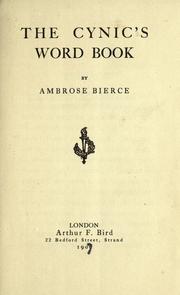
The Devil's Dictionary is a satirical dictionary written by American journalist Ambrose Bierce, consisting of common words followed by humorous and satirical definitions. The lexicon was written over three decades as a series of installments for magazines and newspapers. Bierce's witty definitions were imitated and plagiarized for years before he gathered them into books, first as The Cynic's Word Book in 1906 and then in a more complete version as The Devil's Dictionary in 1911.
"Moxon's Master" is a short story by American writer Ambrose Bierce, which speculates on the nature of life and intelligence. It describes a chess-playing automaton that murders its creator. First published in The San Francisco Examiner on April 16, 1899, it is one of the first descriptions of a robot in English-language literature written much before the word 'robot' came to be used. The story was included in the 1910 edition of the short story anthology Can Such Things Be?.
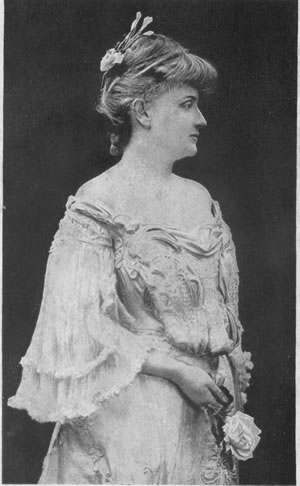
Gertrude Franklin Horn Atherton was an American writer. Many of her novels are set in her home state of California. Her bestselling novel Black Oxen (1923) was made into a silent movie of the same name. In addition to novels, she wrote short stories, essays, and articles for magazines and newspapers on such issues as feminism, politics, and war.
"Hero" is episode 9 of season 1 in the television show Angel. Written by Tim Minear and Howard Gordon and directed by Tucker Gates, it was originally broadcast on November 30, 1999 on the WB television network. In "Hero", Angel joins Doyle’s crusade to save a group of part-human Lister demons from The Scourge, an army of supremacist stormtrooper demons who claim "pure" blood and consequently persecute those of "mixed" blood. While Doyle goes after a strayed Lister teen and Cordelia handles details of the escape plan, Angel infiltrates the enemy and discovers their secret weapon, a bomb-like device called the Beacon that combusts anyone with any taint of human blood. Events lead to a climactic showdown aboard a tramp freighter, where Doyle finally confesses his half-demon heritage—and his love for her—to Cordelia, and proves that he, like Angel, is a Champion in his own right.

"An Occurrence at Owl Creek Bridge" (1890) is a short story by American writer and Civil War veteran Ambrose Bierce, described as "one of the most famous and frequently anthologized stories in American literature". It was originally published by The San Francisco Examiner on July 13, 1890, and was first collected in Bierce's book Tales of Soldiers and Civilians (1891). The story is set during the American Civil War and is known for its irregular time sequence and twist ending. Bierce's abandonment of strict linear narration in favor of the internal mind of the protagonist is an early example of the stream of consciousness narrative mode.
"The Exiles" is a science fiction short story by Ray Bradbury. It was originally published as "The Mad Wizards of Mars" in Maclean's on September 15, 1949 and was reprinted, in revised form, the following year by The Magazine of Fantasy & Science Fiction. First collected in The Illustrated Man (1951), it was later included in the collections R Is for Rocket (1962), Bradbury Stories: 100 of His Most Celebrated Tales (2003), A Sound of Thunder and Other Stories (2005) and A Pleasure to Burn. It was also published in "The Eureka Years: Boucher and McComas's Magazine of Fantasy and Science Fiction" (ISBN 0553206737).
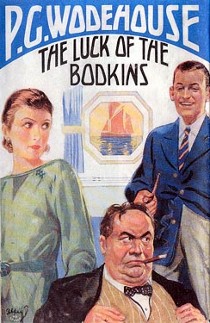
The Luck of the Bodkins is a novel by P. G. Wodehouse, first published in the United Kingdom on 11 October 1935 by Herbert Jenkins, and in the United States on 3 January 1936 by Little, Brown and Company. The two editions are significantly different, though the plot remains the same. The novel was serialised in The Passing Show magazine (UK) from 21 September to 23 November 1935, and this version was published as the UK edition. For its US magazine appearance, in the Red Book between August 1935 and January 1936, Wodehouse re-wrote the story, reducing its length, and this became the US book edition.
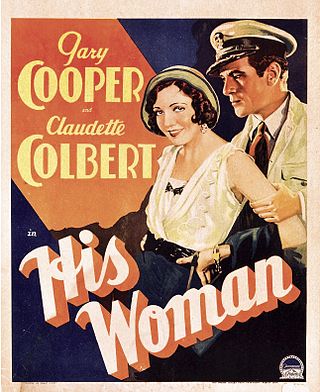
His Woman is a 1931 American pre-Code romance drama film directed by Edward Sloman and starring Gary Cooper and Claudette Colbert. Based on the novel His Woman by Dale Collins, the story is about a tough sea captain who discovers a baby aboard his freighter and hires a tramp, masquerading as a missionary's daughter, to care for the infant on their passage to New York.
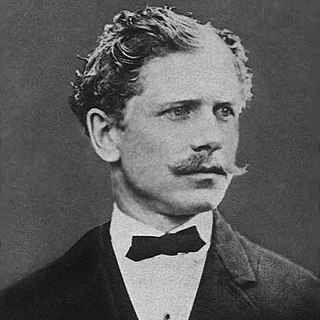
Ambrose Gwinnett Bierce was an American short story writer, journalist, poet, and American Civil War veteran. His book The Devil's Dictionary was named one of "The 100 Greatest Masterpieces of American Literature" by the American Revolution Bicentennial Administration. His story "An Occurrence at Owl Creek Bridge" has been described as "one of the most famous and frequently anthologized stories in American literature", and his book Tales of Soldiers and Civilians was named by the Grolier Club one of the 100 most influential American books printed before 1900.

The Memnon was the first clipper ship to arrive in San Francisco after the Gold Rush, and the only clipper to arrive in San Francisco before 1850. Built in 1848, she made record passages to San Francisco and to China, and sailed in the first clipper race around Cape Horn.
Antelope was a medium clipper built in 1851 in Medford, near Boston, Massachusetts. She sailed in the San Francisco, China, and Far East trades, and was known for her fine finish work and for her crew's escape from pirates. She is often called Antelope of Boston to distinguish her from the extreme clipper Antelope of New York launched in 1852.
"The Moonlit Road" is a gothic horror short story by American Civil War soldier, wit, and writer Ambrose Bierce. It first appeared in a 1907 issue of Cosmopolitan magazine, illustrated by Charles B. Falls. This story is presented in three parts and relates the tale of the murder of Julia Hetman from the perspective of her son, a man who may be her husband, and Julia herself, through a medium.
"Killed at Resaca" is a short story by American Civil War soldier, wit, and writer Ambrose Bierce. First published in The San Francisco Examiner on June 5, 1887, it was later included in Bierce's Tales of Soldiers and Civilians in 1891.
Bertha Clark Pope Damon (1881–1975) was an American humorist, author, lecturer, and editor. She wrote the best-selling humorous memoir Grandma Called It Carnal.
"The Eyes of the Panther" is a short story by American Civil War soldier, wit, and writer Ambrose Bierce featuring a female werepanther. It was published in The San Francisco Examiner on 17 October, 1897 before appearing in his 1898 collection In the Midst of Life.

"The Death of Halpin Frayser" is a Gothic ghost story by Ambrose Bierce. It was first published in the San Francisco periodical The Wave on December 19, 1891 before appearing in the 1893 collection Can Such Things Be?

"The Realm of the Unreal" is a short story by American Civil War soldier, wit, and writer Ambrose Bierce. It appeared in The San Francisco Examiner on July 20, 1890 and was reprinted in the 1893 collection Can Such Things Be?

The Hazen Brigade Monument at Stones River National Battlefield, Murfreesboro, Tennessee, is the oldest American Civil War monument remaining in its original battlefield location.

SS Jarvis Lord was a wooden-hulled American Great Lakes freighter in service between 1872 and 1885. She sank without loss of life in the Manitou Passage on Lake Michigan on August 17 or 18, 1885, while loaded with iron ore.